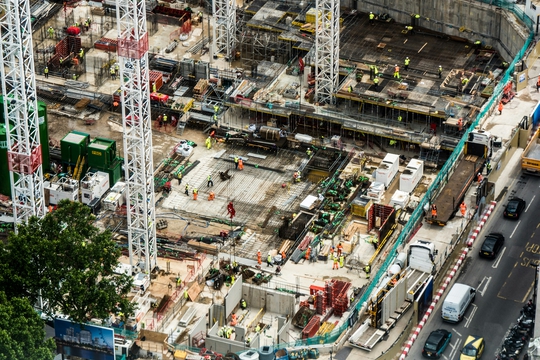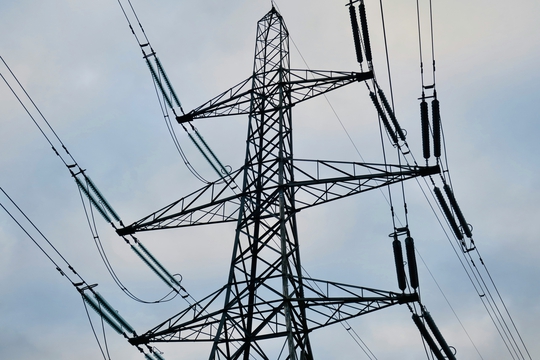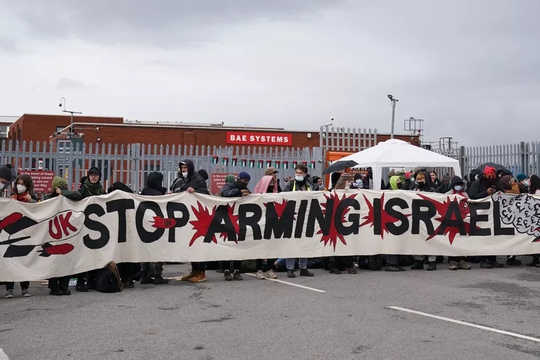From The Premises Now in Existence
by
Notes from Below (@NotesFrom_Below)
April 24, 2024
Featured in Struggling to Work (#20)
An introduction to issue 20

inquiry
From The Premises Now in Existence
by
Notes from Below
/
April 24, 2024
in
Struggling to Work
(#20)
An introduction to issue 20
In this issue of Notes from Below, we return to the mainstay of our publication: worker writing. This issue aimed to return our focus to workers’ inquiries, particularly with forms of work necessary for social reproduction. For us, as editors of Notes from Below, communist politics is inextricably linked to the politics of work. As our previous issue, “The Political Leap”, detailed, communist politics today is not solely about the workplace but also about fighting oppression wherever it manifests and organising in our communities. However, the workplace remains a key site through which class is formed, experienced and exercises its collective power, as well as where oppression manifests.
We do not think that class is an abstract concept. Classes are created and defined through conflict. We are formed as a working class through our struggles at work. This is both the way that we are shaped by capital in the workplace, as well as the ways we fight against capital. The importance of class composition analysis is that it draws stark attention to how classes form, develop, and change; through technical, social and political composition.
Through changing technical composition, the working class is shaped by capital through workplace relations. The conditions under which we work, as well as the way our work is organised, are the underpinnings of capitalism. Understanding what is happening in the workplace is central to developing a practical analysis of capitalism more widely. These new technical compositions provide both challenges and opportunities for workers’ struggles.
However, as we have argued, class is also shaped by how we reproduce ourselves in society. This means how we meet our needs, including access to housing, the dynamics of our communities, as well the role of oppression and our relationship to the state and its disciplinary apparatuses. Through social composition, the working class is shaped in broader society. Many forms of work discussed in this issue shape the social composition of other workers - education, care, health and infrastructure. Inquiries can help us make sense of these different aspects of class composition. It can shine a light on points of connection which are often hidden. Drawing out the clarity of our technical and social compositions sharpens our ability to act politically, strengthening our political composition as a class for ourselves.
Our focus on work is not simply an abstract obsession with technology or production. For us, the exercise of understanding the world from the perspective of the working class is the foundation of communist politics. It is the starting point for understanding our ability to act, and offers a roadmap for developing class power. We need class power, but class formation is contingent on our ability to organise and act collectively.
As the current moment has shown, there are sources of political recomposition beyond the workplace. The scale and intensity of the Palestine solidarity mobilisations are part of a new political composition, albeit one not connected explicitly to the workplace. This is a testament to the fact that struggles elsewhere have resonances which can catalyse political compositions. The question is whether that political composition finds an articulation with class power. Communists need to be attentive to these possibilities and the limitations of political compositions that come adrift.
We used our last issue to platform political proposals for our current conjuncture. In this issue, we return to worker inquiries to continue to develop the interplay between inquiry and politics, which we argue is central to developing our class power. The political leap can only be maintained through a continued understanding of those struggling to work.
In “Power and Purpose: Struggles in the Energy Sector”, an anonymous energy worker discusses the struggles of organising within the energy sector, where management employs both the carrot and the stick to play sectional interests off against the interests of the wider, international working class.
In “A Hospital in Crisis”, three clinical support workers from the Wirral University Teaching Hospital discuss striking for over 50 days, demanding fair pay and recognition for their vital clinical roles. Despite facing neglect, violence, and burnout, they stand united, highlighting the urgent need for systemic change and respect for healthcare workers nationwide.
In “Contradictions in Care”, by Lyra Unguent and Connor Cameron, two care and support workers in London, discuss the complexities of their work, including the challenges of navigating emotional bonds with clients and the impact of privatisation on working conditions. Despite facing fragmentation and isolation, they argue for collective action to demand better wages, conditions, and democratic control over social care.
In, “The Kids Are Alright: A School Workers’ Inquiry”, a group of young school workers representing different jobs in various different stages of the education system discuss the changing nature of schools, the role they play in a capitalist society, and the current state of worker organisation in the sector. Their own experiences cover working as receptionists, professional services, teaching assistants, and teachers, from primary school up to sixth form college, and membership of different unions organising in the sector.
In “Strike Action Unites Northern Ireland”, Pádraig de Cléir, a teacher and INTO member in West Belfast, discusses the merits and limitations of the recent wave of coordinated strikes across the public sector in the north of Ireland.
Finally, in “Solidarity and Labour Organising: An Interview with Workers In Palestine”, we interviewed Riya Al’Sanah about the Palestine solidarity movement. Following the international upsurge of demonstrations, blockades, and workplace actions, the interview discusses the history and direction of the solidarity movement, as well as the importance of worker-to-worker solidarity within it.
We wanted to include the interview with Workers In Palestine in this issue as much of our recent activity and organising has been against the Israeli genocide in Palestine. While this interview may not seem like an obvious choice to include within an issue mainly made up of inquiries into health, care, education, and energy work, we understand two clear connections between Palestine and the theme of this issue.
First, Palestine is a class issue. Since October 2023, there has been the rebirth of an international movement of solidarity with Palestine. As the Israeli military carries out a genocide live on our phone screens, the response has been the mobilisation of millions of people around the world. There have been regular demonstrations, Palestinian flags on each lamppost in some neighbourhoods, and blockades of arms factories. This surge in solidarity has highlighted a gap in anti-imperialist politics more widely. Our interview with Workers in Palestine tries to fill this gap by focusing on the need to understand Palestine as a class issue, drawing attention to the importance of understanding imperialism today.
Second, the role of the British state has come to the fore as a direct supporter of the genocide, as well as the role of BAE systems and other arms companies in supplying the Israeli military. Of course, the role of the British state in Palestine goes back to the British Mandate for Palestine and the Balfour Declaration in the early 20th century. However, today, there is growing evidence of the British state providing direct support for the genocide from airbases in Cyprus, as well as political support from across the bourgeois political parties. Along with the backing from the US, this has provided a shield to the Israeli state in sustaining the genocide in Gaza.
Britain is the seventh largest weapons exporter, mainly selling to the Middle East. The arms industry is heavily state-regulated, with many of the firms previously being nationally owned. The state plays a vital role in facilitating international contracts for the arms industry. As we begin to organise as workers in the Palestine solidarity movement, further links between Britain and Israel are becoming apparent. For example, Demilitarise Education has found almost £1.9 billion in links between universities and the arms industry. Companies like BAE systems have become major funders of research projects, departments, and studentships. As state funding has withdrawn from more of the higher education sector, privatisation has meant universities become fused with private interests. In the case of the arms industry, this makes universities increasingly complicit in the Israeli genocide.
Beyond direct military purposes, British companies are also major suppliers of teargas and rubber bullets used by states against protestors across the world. We can, therefore, see how the relationship to the state is essential for understanding class relations not only in Britain, but also internationally: from the IOF murdering Palestinian civilians to the NYPD attacking Black Lives Matter demonstrators. When we take steps towards challenging the connections with the arms industry in our workplaces, we raise these political questions in a new way. While we have seen glimpses of this with recent blockades of arms factories, there is still a long way to go in fully enforcing these demands in practice.
The Palestine solidarity movement is an important example of how new political moments can open up with little warning. This is an essential reminder that the best-laid plans of communists can be thrown into chaos by the realities of class struggle, both in the country we live in and internationally. In this issue, we have taken a brief step back to consider the political openings and opportunities that could emerge.
Some clear macro trends emerge through this issue, as well as being witnessed around us. The British welfare state has been going through a long period of retreat. The last 14 years of state policy have been defined by austerity. What was once presented as a temporary rebalancing of state expenditure has now become the horizon of parliamentary politics, be it Labour or Tory. Whoever wins the next election, austerity will continue to be the policy.
Austerity and the following process of state retreat have been implemented in country after country amid economic crises, often in return for access to International Monetary Fund loans. State employees have been sacked, welfare budgets destroyed, and vulnerable people thrown to the mercy of the market over and over again throughout the 20th century. The programme of self-described “anarcho-capitalist” Javier Milei in Argentina - which has already provoked a general strike - is perhaps the most honest example of neoliberal policy.
This neoliberal approach has taken on different forms in each country. In Britain, capitalism has generally tended to raise living standards internally while relying on slavery, famine, terrorism, and war externally. In many ways, the success of the arms industry is a continuation of this process: selling weapons to be used abroad while recouping tax money to pay for state services here. Since the crisis of 2008, the steady progression of living standards has faltered. Living standards for the bottom 50% of households are set to be 7-20% lower in 2024-25 than pre-pandemic. The poorest 10% will be £4,600 worse off a year. The younger generations in Britain are the first who will do worse than their parents on almost every indicator. This is an unparalleled decline in living standards that combines with a long decline in the capacity of the state to provide a previous baseline of services.
The attacks on public services have not only shrunk the size of the service but have also transformed the experience of work. The fear many of our contributors have expressed to even write about their experience openly testifies to how work is further defined by authoritarian managerialism. This authoritarian managerialism attempts to cover the cracks of under-resourced, under-staffed systems by demanding stricter discipline and unquestioning obedience to employers’ authority in the workplace, whilst simultaneously being willing to act illegally to repress any organised workers that dare challenge this situation. Complex bureaucratic structures are used to divert and disempower rebellious workers away from forms of struggle that could contest power in the workplace. However, recognising that the threats employers make against workers breaking these structures are just paper tigers is meaningless on its own: we must also begin to build organisational forms that can initiate effective struggles in the workplace, so that workers can control themselves.
As the inquiries into school and care work in this issue illustrates, this authoritarianism manifests not only in how bosses manage workers, but in how different elements of our class interact. From health workers’ strict application of the hospital hierarchy; to the disciplinarian teachers shouting at their students for a meaningless infraction; to the disabled care employer overbearingly managing their caregiver, this seeping authoritarianism produces corrosive interpersonal dynamics that act as barriers to potential forms of solidarity. These situations only worsen existing racialised and gendered forms of social control. In recognising these divisions, and their potential to deepen intra-class divides, we must seek to find political horizons that create common interests.
In this, we can learn from the recent strikes in the north of Ireland, which saw the interests of public sector workers - and, more generally, the working class as a whole - cut across community divides for a universal working-class cause. Across the different inquiries, we can see these issues of unity and division. Whilst the strikes in the north of Ireland provide an inspiring example of unity, there are also clear points of division in the care, hospital, and energy inquiries. When unity holds sway, then these struggles have the potential to become more widespread. They can move into making demands of the state that can win widespread working class support. This can be seen with the identification of a common enemy in the political class, with public sector wages as a combining issue.
On the other hand, when divisions rule, this scaling up of struggles can be blocked, making sectional outcomes much more likely. For example, in the healthcare inquiry, the hospital hierarchies divide workers from each other in the same workplace. Sectionalism in the energy sector can cut workers off from the rest of the class. In care, this dynamic can be seen in workers and service users being divided by the organisation of employment.
We draw attention to these different dynamics because they can affect the trajectory of struggles. Political recomposition is never an inevitable outcome of the shifting technical and social composition, but a political task that needs to be achieved by workers at the rank and file level. Different technical and social compositions create the basis for possible unity - and indeed division - but it is a political task to make that happen in practice. For example, the intervention of NHS Workers Say No has started to help shift the latent divisions in the NHS.
We are in a moment of recomposition, shaped by distributional conflict that intensifies under the pressure of climate collapse. These dynamics will only become more pronounced. As long as authoritarian managerialism continues to go unchecked in different areas of the economy, workplaces will inevitably slip into irretrievable dysfunction and managed decline. We need inquiry to understand the concrete forms that this recomposition can take, and to think through options for recomposition that diverge from “the same as before but with more funding” and instead start to propose the revolutionary reorganisation of work, whether that be in care, education, health, or society more widely. As the struggle for Palestinian liberation is teaching us, systems of oppression are central to our economic system, making many of our workplaces complicit in ways we didn’t know. The unified calls for a free Palestine must also be a call for the communist reorganisation of the systems that keep it unfree.
Part of our role as communists is to link up various working-class struggles - be they against war, workplace exploitation, or our overall social reproduction - so that we can go beyond sectional struggles towards a fight that is in the interests of the international working class as a whole: revolution and building a new, communist society. This task requires both inquiry and organisation. If communism is, as Marx once argued, “the real movement which abolishes the present state of things”, then we need inquiry - now more than ever - to understand how “the conditions of this movement result from the premises now in existence”.1 It is through organisation, then, that we can move to build this together.
Featured in Struggling to Work (#20)
author
Notes from Below (@NotesFrom_Below)
Subscribe to Notes from Below
Subscribe now to Notes from Below, and get our print issues sent to your front door three times a year. For every subscriber, we’re also able to print a load of free copies to hand out in workplaces, neighbourhoods, prisons and picket lines. Can you subscribe now and support us in spreading Marxist ideas in the workplace?
Read next


